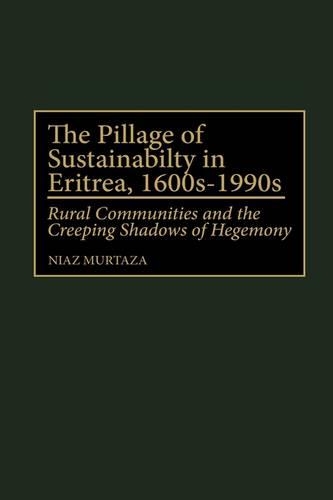
The Pillage of Sustainability in Eritrea, 1600s-1990s: Rural Communities and the Creeping Shadows of Hegemony
(Hardback)
Publishing Details
The Pillage of Sustainability in Eritrea, 1600s-1990s: Rural Communities and the Creeping Shadows of Hegemony
By (Author) Niaz Murtaza
Bloomsbury Publishing PLC
Praeger Publishers Inc
20th August 1998
United States
Classifications
Tertiary Education
Non Fiction
Rural communities / rural life
307.7209635
Physical Properties
Hardback
224
Width 156mm, Height 235mm
510g
Description
Because of its history and location, Eritrea is an ideal example for a study of the sustainability of traditional rural communities and the impact of local and external actors on them. This book provides a lucid account of the pillage of rural sustainability under modern hegemonic conditions. It traces the manner in which the imprints left by European rule were accentuated during Ethiopian control. These legacies continue to haunt rural communities after independence in the shape of resource shortages, the dominance of western civilization, and the modernization-based policies of the ruling Eritrean class which originated under European rule.
Reviews
[T]his is a clearly organized and valuable study that provides a good starting point for further inquiry. Murtaza's striving to identify the nexus between the policies of hegemonic actors and the downward trajectory of indigenous social systems is revealing. His contention that famine and poverty are consequences of policy rather than a dictate of nature is salutatory. The numerous graphs and statistical tables are instructive. Morevoer, the book comes at an opportune time, serving as a clarion call not only against the horrifying war currently unfolding in the region, but also the long-term threat it poses to the viabilty of rural communities.-African Studies Quarterly
Murran's work is exciting for its originality and insight in to the new Eritrean state and the challenges it faces as a predominantly agricultural and pastoral society entering the fray of globally-determined and locally-implemented capitalist processes. His serious attention to the extensive variation within and between rural Eritrean communities is fascinating and commendable. Moreover, his critical approach to the new Eritrean state does not engage in the political axe-grinding characterizing too much Horn of Africa scholarship.-Northeast African Studies
"This is a clearly organized and valuable study that provides a good starting point for further inquiry. Murtaza's striving to identify the nexus between the policies of hegemonic actors and the downward trajectory of indigenous social systems is revealing. His contention that famine and poverty are consequences of policy rather than a dictate of nature is salutatory. The numerous graphs and statistical tables are instructive. Morevoer, the book comes at an opportune time, serving as a clarion call not only against the horrifying war currently unfolding in the region, but also the long-term threat it poses to the viabilty of rural communities."-African Studies Quarterly
"Murran's work is exciting for its originality and insight in to the new Eritrean state and the challenges it faces as a predominantly agricultural and pastoral society entering the fray of globally-determined and locally-implemented capitalist processes. His serious attention to the extensive variation within and between rural Eritrean communities is fascinating and commendable. Moreover, his critical approach to the new Eritrean state does not engage in the political axe-grinding characterizing too much Horn of Africa scholarship."-Northeast African Studies
"[T]his is a clearly organized and valuable study that provides a good starting point for further inquiry. Murtaza's striving to identify the nexus between the policies of hegemonic actors and the downward trajectory of indigenous social systems is revealing. His contention that famine and poverty are consequences of policy rather than a dictate of nature is salutatory. The numerous graphs and statistical tables are instructive. Morevoer, the book comes at an opportune time, serving as a clarion call not only against the horrifying war currently unfolding in the region, but also the long-term threat it poses to the viabilty of rural communities."-African Studies Quarterly
Author Bio
NIAZ MURTAZA is a Researcher at the University of California, Berkeley, with a focus on International Rural Development.
